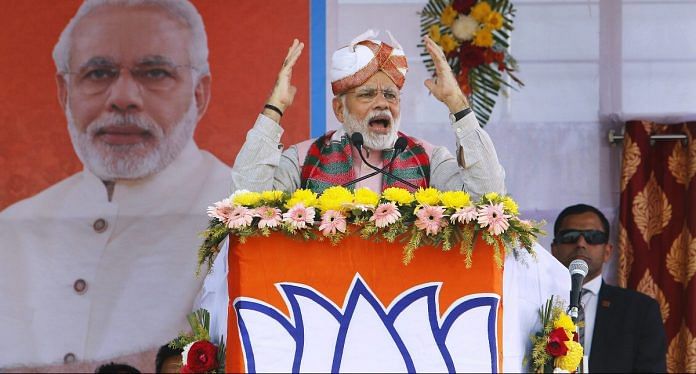While so much noise is being made, the government is yet to attempt the important challenge of finding a political consensus.
The New Year has begun with a strong pitch from both the President and the Prime Minister for holding simultaneous Lok Sabha and assembly polls. President Ram Nath Kovind made a mention of this in his joint address to Parliament before the Budget Session, while Prime Minister Narendra Modi has flagged the issue often.
Simultaneous elections were held in 1951-52, 1957, 1962 and 1967. The cycle was disrupted due to premature dissolution of state assemblies and, in 1970, the Lok Sabha, too, was dissolved early.
Why is Modi so keen on simultaneous polls? He appears to believe that if the polls are held together, voters might vote for him even in the states where opposition parties rule. Winning a second term would make him stronger within his party, with the allies, and also summarily diminish the power of the opposition.
Second, this is not a new idea. The Bharatiya Janata Party has been talking about synchronising state and national elections for some time. Former Prime Minister Atal Bihari Vajpayee, and later in 2009, L.K. Advani had raised the issue with the Congress. The BJP in its manifestos for the 2009 and 2014 Lok Sabha polls had promised to evolve a method for simultaneous polls.
Third, Modi’s argument is that it will reduce government expenditure and time wasted due to imposition of the Model Code of Conduct, less distraction due to electoral compulsions, smoother governance, more governmental accountability, and even less traffic and noise pollution. The Election Commission has said that it would cost Rs 45 billion for holding simultaneous polls, while the 2014 Lok Sabha elections alone cost Rs 39 billion.
While the idea seems to be good, is the country ready for ‘one nation, one election’?
Chief Election Commissioner O.P. Rawat has declared that the commission is ready to take up the challenge by September this year, provided the constitutional amendments are carried through. The NITI Aayog also advocates simultaneous elections. The parliamentary committee headed by the Congress member E.M. Sudarsana Natchiappan said it was not possible immediately, but a gradual advancement could be made.
Despite all these indications, the government is yet to attempt the important challenge of finding a political consensus. While so much noise is being made, why has no meeting been held for building a consensus? While it might be easier to persuade the BJP-ruled states to curtail their assembly terms, will the opposition-ruled states agree to this? Even NDA allies like Shiv Sena and Akali Dal might not agree.
The opposition parties are not on board yet because they apprehend that simultaneous polls would mean advantage BJP. The main objections come from the regional and smaller parties. They fear that Modi might be taking the country towards a presidential system, hurting the regional leaders. Also, the state and national elections are often fought on different sets of issues.
Even at a recent meeting of the parliamentary standing committee, members belonging to the Congress, Communist Party of India, Communist Party of India (Marxist), Trinamool Congress, Nationalist Congress Party and All India Majlis-e-Ittehadul Muslimeen have rejected the proposal. They say holding simultaneous polls is not realistic or feasible now. Senior Congress leader P. Chidambaram called it a ‘jumla’.
The second challenge is amending the Representation of the People Act, 1951, but constitutional amendments require two-thirds majority and the BJP is nowhere near that. Also, the Constitution of India is silent over whether polls should happen simultaneously.
The third challenge is it is not possible to employ adequate forces in every state because there are only 800 companies of paramilitary forces available, while 3,000 companies are required. The Election Commission would require 24 lakh electronic voting machines and voter verifiable paper audit trail machines.
Is there a way out? The first could be an alternative method of holding elections in two phases. One suggestion is that elections of some assemblies can be held at the mid-term of Lok Sabha and remaining at the end of the term. The terms of some legislative assemblies could be extended while some others may be curtailed. But it is easier said than done.
Though Modi is keen to advance the Lok Sabha polls along with some assembly elections, there seems to be a rethink as he sees the impracticality of such a move. Some of his party seniors are said to have pointed out that advancing elections was a risk, as Vajpayee learnt the hard way in 2004. He has also realised the difficulties in persuading the opposition to fall in line. There is the constitutional restriction, which makes it difficult to extend the terms of some assemblies whose term ends by the end of the year.
While it may not be immediately possible to move towards ‘one nation, one election,’ it is still worth debating and finding ways to eventually do so. As former Chief Election Commissioner T.S. Krishnamurthy points out, simultaneous elections are just not possible in 2019 because the five-year term of governments in some states has just commenced last year, and that polls are due in some other states this year. But it could be thought of by 2024. Perhaps by that time, a way can be found.






